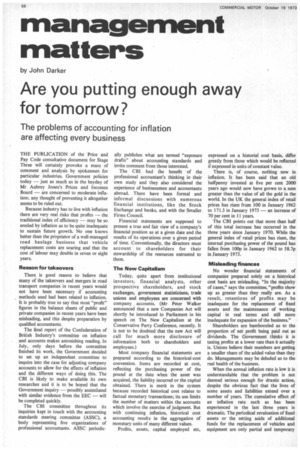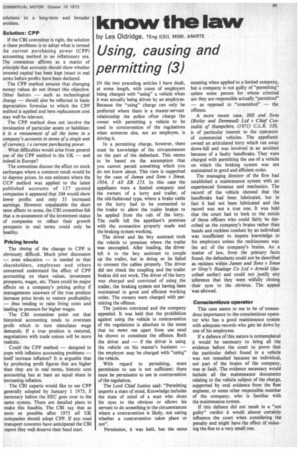management matters
Page 60

Page 61

If you've noticed an error in this article please click here to report it so we can fix it.
Are you putting enough away for tomorrow?
The problems of accounting for inflation are affecting every business
by John Darker
THE PUBLICATION of the Price and Pay Code consultative document for Stage Three will certainly provoke a mass of comment and analysis by spokesmen for particular industries. Government policies today — just as much as in the heyday of Mr Aubrey Jones's Prices and Incomes Board — are concerned to moderate inflation; any thought of preventing it altogether seems to be ruled out.
Because industry has to live with inflation there are very real risks that profits — the traditional index of efficiency — may be so eroded by inflation as to be quite inadequate to sustain future growth. No one knows better than the proprietor of a well-managed road haulage business that vehicle replacement costs are soaring and that the cost of labour may double in seven or eight years.
Reason for takeovers There is good reason to believe that many of the takeovers and mergers in road transport companies in recent years would not have been necessary if accounting methods used had been related to inflation. It is probably true to say that most "profit" figures in the balance sheets of public and private companies in recent years have been misleading, and this despite preparation by qualified accountants.
The final report of the Confederation of British Industry's committee on inflation and accounts makes astonishing reading. In July, only days before the committee finished its work, the Government decided to set up an independent committee to inquire into the case for adjusting company accounts to allow for the effects of inflation and the different ways of doing this. The CBI is likely to make available its own researches and it is to be hoped that the Government inquiry — possibly assimilated with similar evidence from the EEC — will be completed quickly.
The CBI committee throughout its inquiries kept in touch with the accounting standards steering committee (ASSC), a body representing five organizations of professional accountants. ASSC periodic
ally publishes what are termed "exposure drafts" about accounting standards and invite comment from those interested.
The CBI had the benefit of the professional accountant's thinking in their own study and they also considered the experience of businessmen and accountants abroad. There have been formal and informal discussions with numerous financial institutions, like the Stock Exchange and banks, and with the Smaller Firms Council.
Financial statements are supposed to present a true and fair view of a company's financial position as at a given date and the results of its operations over a given period of time. Conventionally, the directors must account to shareholders for their stewardship of the resources entrusted to them.
The New Capitalism Today, quite apart from institutional investors, financial analysts, other prospective shareholders, and stock exchanges, government statisticians i trade unions and employees are concerned with company accounts. (Mr Peter Walker announced that a new Companies Act will shortly be introduced to Parliament in his speech on The New Capitalism at the Conservative Party Conference, recently. It is not to be doubted that the new Act will call for much more disclosure of information both to shareholders and employees.)
Most company financial statements are prepared according to the historical-cost convention. Items are recorded at cost, reflecting the purchasing power of the pound at the date when the asset was acquired, the liability incurred or the capital obtained. There is merit in the system because recorded historical cost relates to factual monetary transactions; its use limits the number of matters within the accounts which involve the exercise of judgment But with continuing inflation, historical cost accounting results in the aggregation of monetary units of many different values.
Profits, assets, capital employed etc, expressed on a historial cost basis, differ greatly from those which would be reflected if expressed in units of constant value.
There is, of course, nothing new in inflation. It has been said that an old halfpenny invested at five per cent 2000 years ago would now have grown to a sum greater than the value of all the gold in the world_ In the UK the general index of retail prices has risen from 100 in January 1962 to 171.3 in January 1973 — an increase of 70 per cent in 11 years.
The CBI points out that more than half of this total increase has occurred in the three years since January 1970. While the general index of retail prices has risen, the internal purchasing power of the pound has fallen from 100p in January 1962 to 58.7p in January 1973.
Misleading finances No wonder financial statements of companies prepared solely on a historical cost basis are misleading. "In the majority of cases," says the committee, "profits show up as greater than they really are. As a result, retentions of profits may be inadequate for the replacement of fixed assets and the maintenance of working capital in real terms and still more inadequate for expansion of the business."
Shareholders are bamboozled as to the proportion of net profit being paid out as dividends. The Government thinks it is taxing profits at a lower rate than it actually is. Unions believe their members are getting a smaller share of the added value than they do. Managements may be deluded as to the real health of the business.
When the annual inflation rate is low it is understandable that the problem is not deemed serious enough for drastic action, despite the obvious fact that the lives of some assets and liabilities extend over a number of years. The cumulative effect of an inflation rate such as has been experienced in the last three years is dramatic. The periodical revaluation of fixed assets or the setting aside of additional funds for the replacement of vehicles and equipment are only partial and temporary ;olutions to a long-term and broader problem.
Solution: CPP If the CBI committee is right, the solution :co these problems is to adopt what is termed the current purchasing power (CPP) wcounting method in an inflationary era. The committee affirms as a matter of principle that accounts should show whether nvested capital has been kept intact in real .erms before profits have been declared.
The CPP method ensures that changing money values do not thwart this objective. Other factors — such as technological :hange — should also be reflected in basic depreciation formulae to which the CPP method is applied and here replacement cost may well be relevant.
The CPP method does not involve the revaluation of particular assets or liabilities: it is a restatement of all the items in a company's accounts in terms of a single unit of currency, i e current purchasing power.
What difficulties would arise from general use of the CPP method in the UK — and indeed in Europe?
The committee discuss the effect on stock exchanges where a common result would be to depress prices. In one estimate where the CCP method was applied to the latest published accounts of 137 quoted companies it appeared that 104 would show lower profits and only 33 increased earnings. However unpalatable the short term effects to some, the CBI committee felt that a re-assessment of the investment status of companies to reflect their growth prospects in real terms could only be healthy.
Pricing levels The timing of the change to CPP is obviously difficult. Much prior discussion — even education — is needed so that shareholders, employees and others concerned understand the effect of CPP accounting on share values, investment prospects, wages, etc. There could be major effects on a company's pricing policy if managements unaware of the true position increase price levels to restore profitability — thus tending to raise living costs and leading to pressure for higher wages.
The CBI committee point out that historical accounting tends to overstate profit which in turn stimulates wage demands. If a true position is restored, negotiations with trade unions will be more realistic.
Could the CPP method — designed to cope with inflation accounting problems — itself increase inflation? It is arguable that by producing profit figures that are higher than they are in real terms, historic cost accounting has at least an equal share in increasing inflation.
The CBI experts would like to see CPP generally adopted by January 1 1975, if necessary before the EEC goes over to the same system. There are detailed plans to make this feasible. The CBI say that as soon as possible after 1975 all UK companies should adopt CPP. If any road transport concerns have anticipated the CBI report they well deserve their head start.








































































































